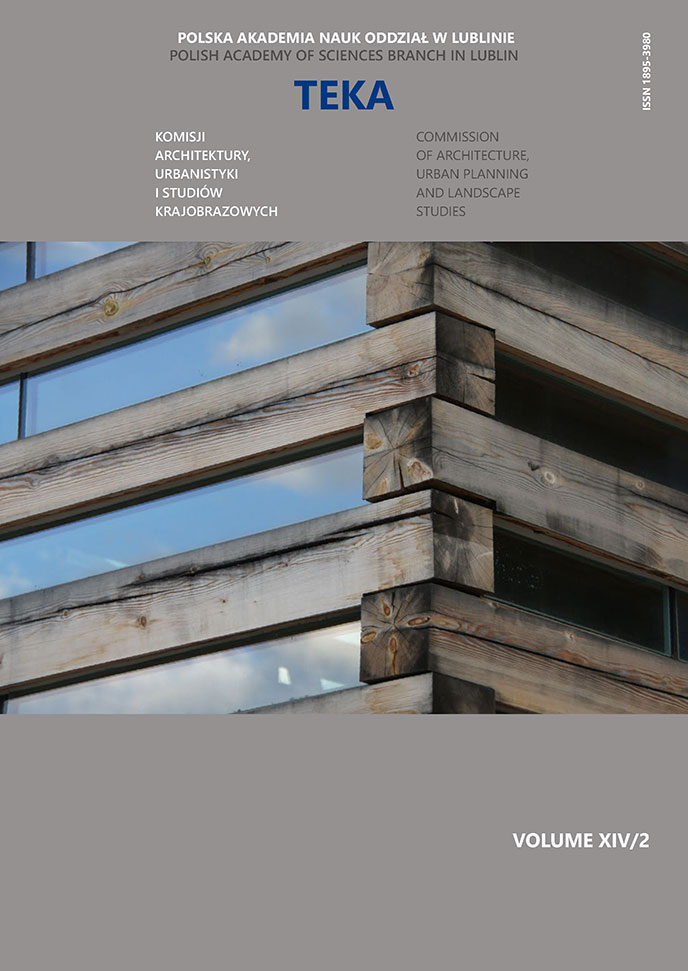Search of futuristic principles for the concept of the medical center for young people
Article Sidebar
Issue Vol. 14 No. 2 (2018)
-
Town of Zhovkva (Żółkiew) in western Ukraine – an example of urban complex built at the end of the 16th century on the concept of the renaissance “ideal town”
Mykola Bevz7-20
-
Architect Max Zucker – regionalist or modernist? Designs from the Prut valley in the Hutsul region
Jacek Czubiński21-27
-
Tracking nature – the possibilities of introducing permaculture strategies into the historical city centre of Zamość. The Courtyards
Katarzyna Kielin28-37
-
Search of futuristic principles for the concept of the medical center for young people
Oleg Krasylnykov, Viktor Proskuryakov, Hayane Akopyan38-42
-
Allotment gardens in the Lublin downtown in the spatial and urban planning context – origins and issues concerning their preservation
Natalia Przesmycka, Rafał Strojny43-58
-
Shaping space in practical therapy
Piotr Gleń59-63
-
Assessment of use of public transport in cities by elderly and disabled persons
Katarzyna Solecka, Małgorzata Figura64-75
-
Stone wood and metal in the memorial sculpture of Ukrainian historical cemeteries of the Polish-Ukrainian borderlands
Olena Stasyuk76-82
-
Evaluation of the protection status of masonry crowns and proposals for their repairs – the castle in Janowiec on the Vistula
Maciej Trochonowicz, Bartosz Szostak, Daniel Lisiecki, Wojciech Królikowski83-91
-
The paradox of safety in urban space
Hubert Trammer92-96
-
Shaping of the systems of greenery in the districts of Lublin Cooperative Housing (LSM) in the context of planning and implementation of the project
Kamila Boguszewska, Natalia Przesmycka97-110
-
Location of single-family house settlements from 60s to 80s of 20th century in Wrocław’s urban space
Zuzanna Napieralska111-116
-
Eyetracking as a method to create new possibilities in urbanistic experimental research
Wojciech Kocki, Bartłomiej Kwiatkowski, Magdalena Borys, Mariusz Dzieńkowski, Wioletta Tuszyńska-Bogucka, Jacek Bogucki, Jarosław Pełka117-124
-
Recovery of urban development stages of town Rashkiv
Illia Lytvynchuk, Mykola Bevz, Bogusław Szmygin125-137
Archives
-
Vol. 16 No. 4
2020-12-30 11
-
Vol. 16 No. 3
2020-09-30 10
-
Vol. 16 No. 2
2020-06-30 11
-
Vol. 16 No. 1
2020-03-31 10
-
Vol. 15 No. 4
2019-12-30 6
-
Vol. 15 No. 3
2019-10-31 9
-
Vol. 15 No. 2
2019-06-28 12
-
Vol. 15 No. 1
2019-03-29 13
-
Vol. 14 No. 3
2018-10-28 14
-
Vol. 14 No. 2
2018-06-29 14
-
Vol. 14 No. 1
2018-03-30 13
-
Vol. 13 No. 4
2017-12-29 8
-
Vol. 13 No. 3
2017-09-29 9
-
Vol. 13 No. 2
2017-06-30 10
-
Vol. 13 No. 1
2017-03-31 10
-
Vol. 12 No. 4
2016-12-30 12
-
Vol. 12 No. 3
2016-09-30 10
-
Vol. 12 No. 2
2016-06-30 9
-
Vol. 12 No. 1
2016-03-31 8
Main Article Content
DOI
Authors
Abstract
The article emphasizes the role of architecture in creating an atmosphere of mental comfort and its positive impact on human health. Futurological tendencies of the organization of the medical space in the medical facilities of the future are analyzed taking into account the views of students.
Keywords:
References
Gerber M., Brand S, Elliot C, Holsboer-Trachsler E, Pühse U, 2014: Aerobic exercise, ball sports, dancing, and weight lifting as moderators of the relationship between stress and depressive symptoms: an exploratory cross-sectional study with swiss university students. Percept Mot Skills. 119 (3), 679−97. doi: 10.2466/06.PMS.119c26z4. DOI: https://doi.org/10.2466/06.PMS.119c26z4
Golembiewski JA, 2017 Salutogenic Architecture in Healthcare Settings. In: The Handbook of Salutogenesis, Chapter 26. Mittelmark MB, Sagy S, Eriksson M, et al., editors. Cham (CH), Springer. Published online. DOI: https://doi.org/10.1007/978-3-319-04600-6_26
Kötter T, Tautphäus Y, Scherer M, Voltmer E, 2014: Health-promoting factors in medical students and students of science, technology, engineering, and mathematics: design and baseline results of a comparative longitudinal study. BMC Med Educ 14, 134. Published online 2014 Jul 4. doi: 10.1186/1472-6920-14-134. DOI: https://doi.org/10.1186/1472-6920-14-134
Leahy CM, Petersen RF, Wilson IG, Newbury JW, Tonkin AL, Turnbul D, 2010: Distress levels and self-reported treatment rates for medicine, law, psychology and mechanical engineering tertiary students: cross-sectional study. Aust N Z J Psychiatr. 44 (7), 608−15. doi: 10.3109/00048671003649052. DOI: https://doi.org/10.3109/00048671003649052
Miedema E, Lindahl G, Elf M, 2018: Conceptualizing Health Promotion in Relation to Outpatient Healthcare Building Design: A Scoping Review. HERD. Published online 2018 Sep 11. doi: 10.1177/1937586718796651. DOI: https://doi.org/10.1177/1937586718796651
Rasoulpour H, Charehjoo F, 2017: The Effect of the Built Environment on the Human Psyche Promote Relaxation. Architecture Research. 7 (1), 16−23. doi: 10.5923/j.arch.20170701.02.
Shepley MM, Watson A, Pitts F, Garrity A, Spelman E, Kelkar J, Fronsman A, 2016: Mental and Behavioral Health Environments: Critical Considerations for Facility Design. Gen Hosp Psychiatry. 42, 15−21. doi: 10.1016/j.genhosppsych.2016.06.003. DOI: https://doi.org/10.1016/j.genhosppsych.2016.06.003
Shepley MM, Pasha S, 2017: Design for Mental and Behavioral Health: 1st Edition (online), 282 p. DOI: https://doi.org/10.4324/9781315646916
Shiralkar MT, Harris TB, Eddins-Folensbee FF, Coverdale JH, 2013: A systematic review of stress-management programs for medical students. Acad Psychiatr. 37 (3):158−64. doi: 10.1176/appi.ap.12010003 DOI: https://doi.org/10.1176/appi.ap.12010003
The International Academy for Design & Health. https://www.designandhealth.org.
Zhou Y (2014) Healthcare facility research and design. Frontiers of Architecture Research 3: 227. DOI: https://doi.org/10.1016/j.foar.2014.08.002
Article Details
Abstract views: 232


